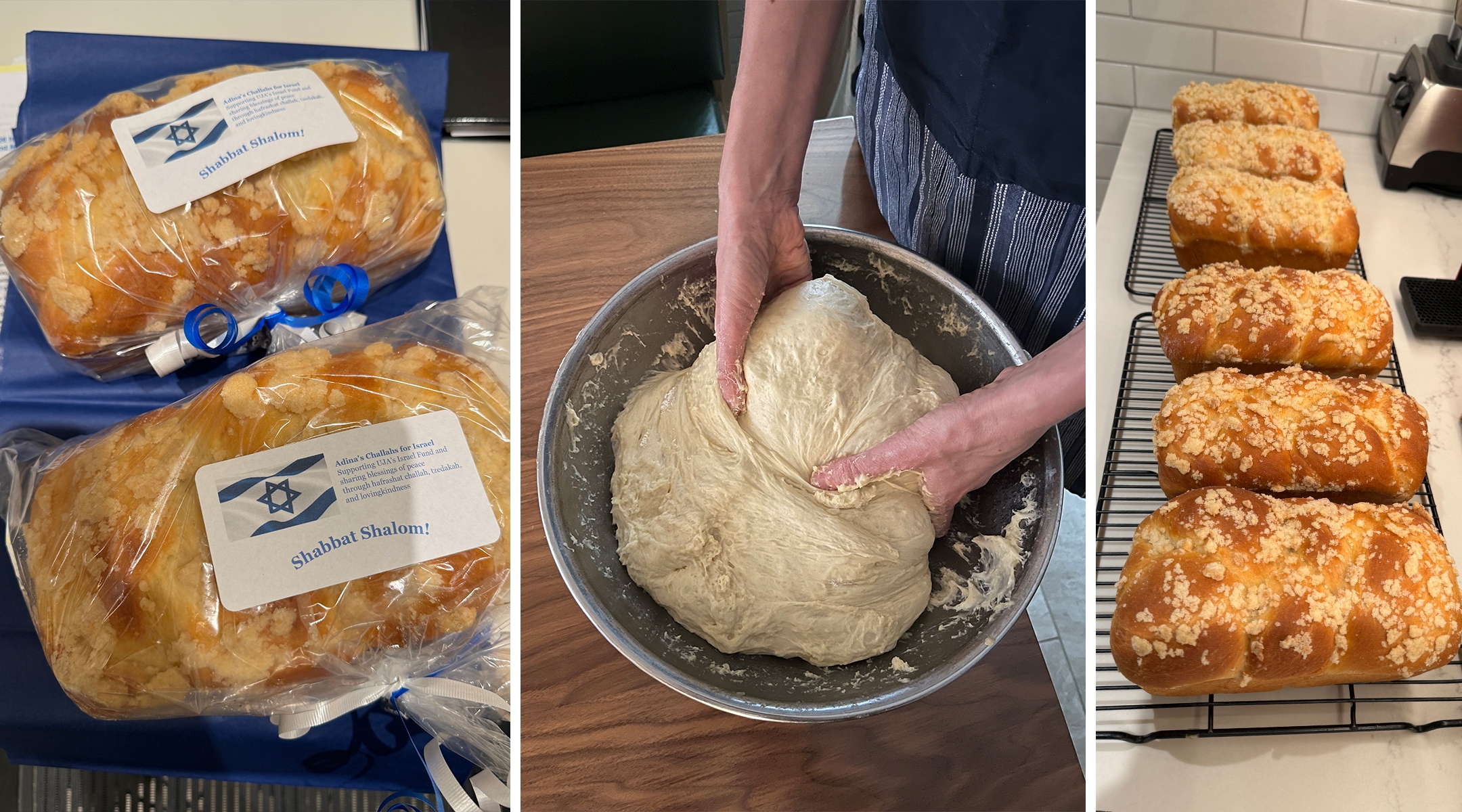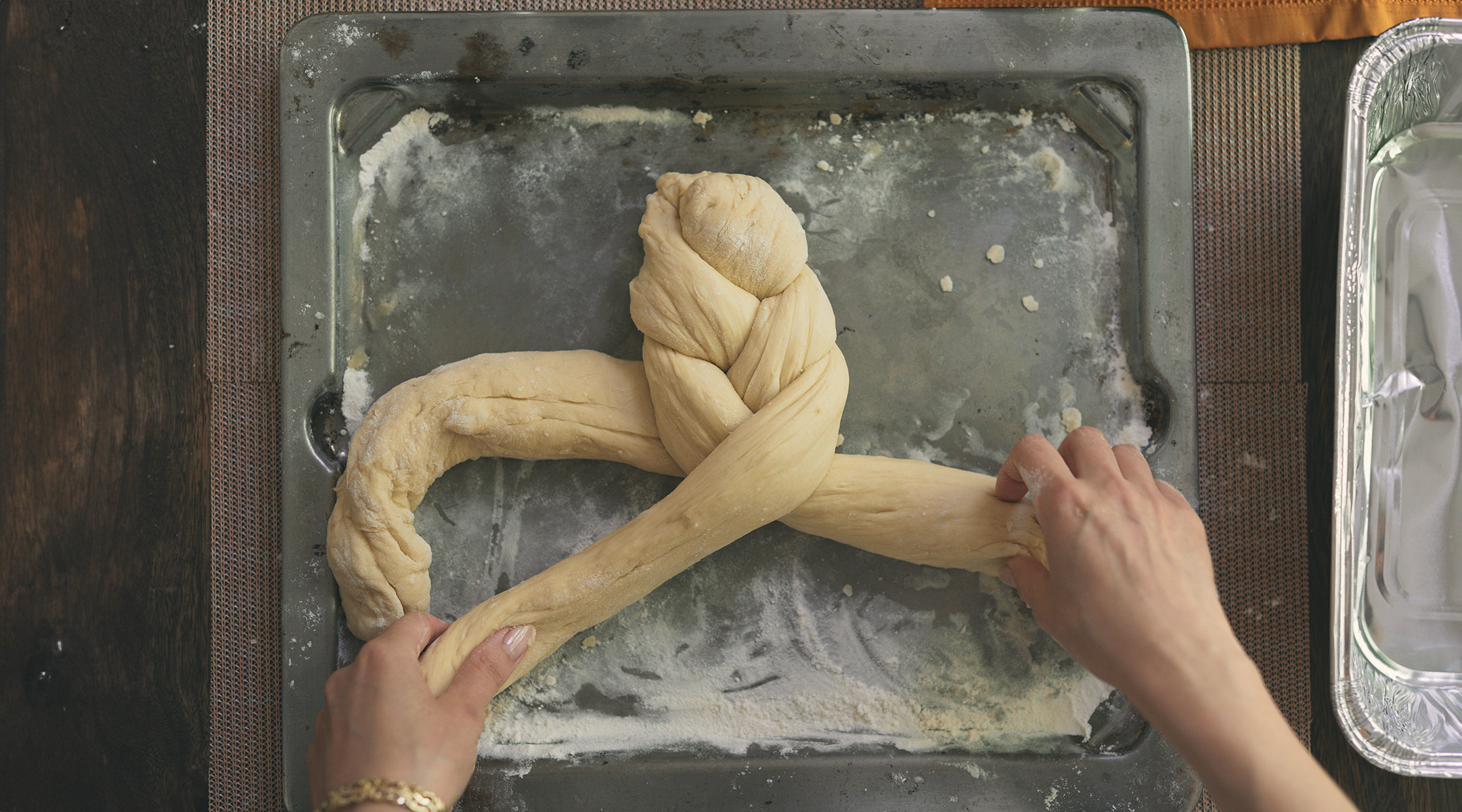(New York Jewish Week) — When Israel was attacked by Hamas on Oct. 7, Adina Wagman was determined to find a way to “do something for Israel,” she said.
Within a matter of weeks, the mother of two realized that the challah she regularly bakes in her modest-sized Upper West Side kitchen could be an ideal tool for assisting Israelis in need.
Wagman, who is Modern Orthodox, has been making homemade challah regularly for 14 years. Normally, her baking is a labor of love for family and guests at her Shabbat table. But since November, Wagman has been gifting fresh-baked loaves each week to New Yorkers who donate at least $36 to UJA-Federation of New York’s Emergency Israel Fund.
“I am so worried about Israel and everything that is going on,” Wagman told the New York Jewish Week. “I feel like it is helpful to feel like you can do even a little bit.”
In the days after the terrorist attacks, Wagmann and her son, Daniel, a 17-year-old junior at the Dalton School, created a website, Adina’s Challahs for Israel, to let people know about the initiative. Donors to the Israel Emergency Fund can send a receipt to adinaschallahs@gmail.com, and Wagman will prepare two challahs, topped with her signature vanilla-scented streusel, that can be picked up from her Upper West Side address on an agreed-upon Friday at 10 a.m.
Since launching her initiative on Nov. 9, Wagman has baked and given away 109 challahs, representing donations of $6,411 to the Israel Emergency Fund. That’s a fraction of the more than $175 million raised as of Feb. 13 by the federation, which so far allocated more than $71 million to support essential services in Israel.
But Adina’s Challahs aren’t just a fundraising initiative — they provide a meaningful opportunity for prayer and connection, too. When requesting Wagman’s challahs, donors are invited to share the name of a person in need of prayers. Like many religiously observant challah bakers, Wagman recites a blessing over the dough during a process called “hafrashat challah,” colloquially known as “separating” or “taking” challah, in which a small piece of the dough is separated from the rest of the batch, a tradition that has its roots in the Hebrew Bible.
Many see that moment of separation as an opportunity for prayer and contemplation, a pause in the midst of the physical acts of kneading the dough and shaping the bread.
“I wanted to do something for Israel — I felt helpless,” Wagman said. “I felt that we needed to daven [pray] a lot. Doing hafrashat challah is very meaningful. If I bake a lot, I get to do a lot of hafrashat challah.”

Upper West Sider Adina Wagman, center, kneads her challah dough; each Friday, she gifts 10 vanilla streusel-topped loaves to New Yorkers who donate to UJA-Federation’s Emergency Israel Fund. (Courtesy and Rachel Ringler)
Wagman has no formal relationship to UJA-Federation, though she and her family donate to the organization and, she said, are “most impressed” with the “incredible leadership” of its CEO, Eric Goldstein. “He has the overall view of what needs to get done and how to allocate funds, and they are transparent — you can go to their Israel Emergency Fund page and see where the money is being spent,” said Wagman. She added that such transparency is especially meaningful to her as a former tax lawyer who worked for several years at the New York law firm, Davis Polk.
(UJA-Federation is a supporter of 70 Faces Media, the New York Jewish Week’s parent company.)
In the weeks after Oct. 7, Wagman sent a rough draft of her website to Atara Burian, a senior development executive at UJA who, like Wagman, is a member of The Jewish Center on West 86th Street. Burian, said Wagman, was very enthusiastic about the project.
“UJA and Atara were deeply moved by Adina’s effort to support UJA and weave community into her project,” Emily Kutner, the federation’s director of public relations, told the New York Jewish Week. “While her project is wonderful in nature, UJA is fortunate to have notoriously active lay leadership across the organization.”
Wagman said her challah project was inspired by previous fundraisers she did for the Heschel School, the Upper West Side Jewish day school where her kids went to elementary school. “I used to put my challahs in the Heschel School auction and they would go for hundreds of dollars,” she said.
Her recipe, which was taught to her by a fellow Upper West Side mother and teacher, is, in Wagman’s words, “crazy easy and forgiving.” It is also delicious — one friend, Michelle Bornstein, describes her loaves as “sweet, with just the right amount of soft in the middle.” Some even encouraged her to start a challah business.
“For years I have been telling Adina she should sell her challah,” said her longtime friend Marnie Black, executive vice president of public relations for AMC Network. “I really think she is the best challah baker on the Upper West Side.”
While that’s no small feat in a very Jewish community that prides itself on its traditional bread, Wagman demurred. “Doing it as a business is a different vibe,” she said. “I like giving it away and making people happy.”
Space is an issue, too: Wagman’s Manhattan kitchen has only one oven and modest storage. For her weekly bake, she uses 10 pounds of King Arthur’s bread flour, plus the requisite amount of eggs, oil, salt, yeast and sugar to make 12 challahs at 1.5 pounds each. Wagman keeps two for her family and gifts the rest.
Sydney Taub, a 30-year old law clerk, first met Wagman when the baker invited her for Shabbat dinner as a way to welcome a young couple into her synagogue’s community. Taub describes Wagman’s challah as “incredible.” Because Taub and her husband are “very intentional about where we are sending our money and, wanting to have an impact to help people in Israel during this difficult time,” she went to Wagman’s site and made a donation.
Taub also sent Wagman the name of a person to include in her prayers. “That extra addition of adding those prayers was something that was really special to me,” Taub said. “Unfortunately, I know someone who is currently a hostage. I felt that putting his name into that bucket [of blessings] was an extra special way to add prayers for him and for all the hostages.”
Wagman said she plans to continue her project as long as there is need. “Hopefully there will be a time when Israel doesn’t need our money,” she said. “The website is called Adina’s Challah, so it can be used for any charity. I told other people that Daniel could make them a website, too, if they have a charity they want to support.”
Wagman’s challah project “shows the power of one person,” UJA’s Kutner said. “For everyone who feels like, ‘Oh, there is nothing I can really do,’ you can see how a little challah can have a big reach and a big impact.”
The New York Jewish Week brings you the stories behind the headlines, keeping you connected to Jewish life in New York. Help sustain the reporting you trust by donating today.





